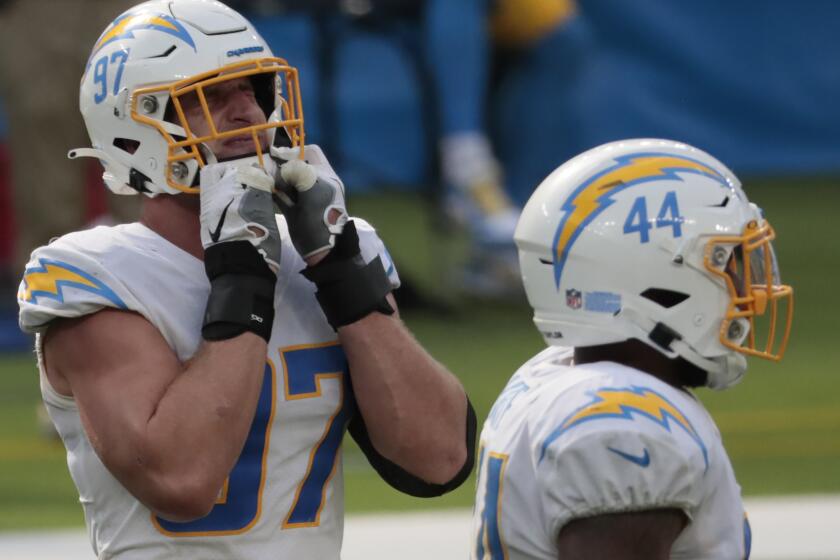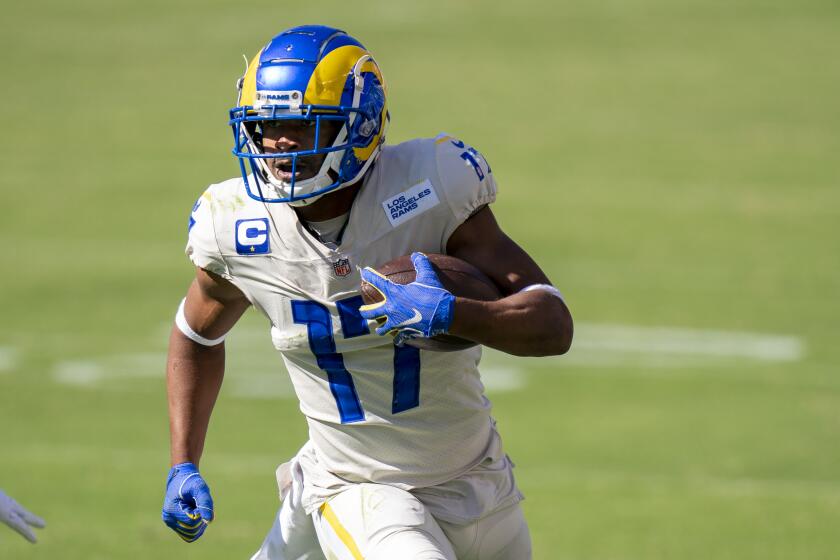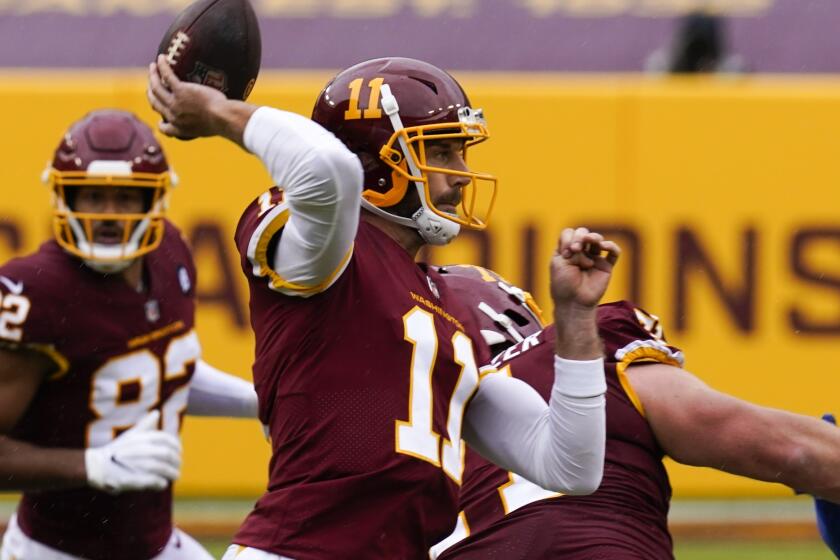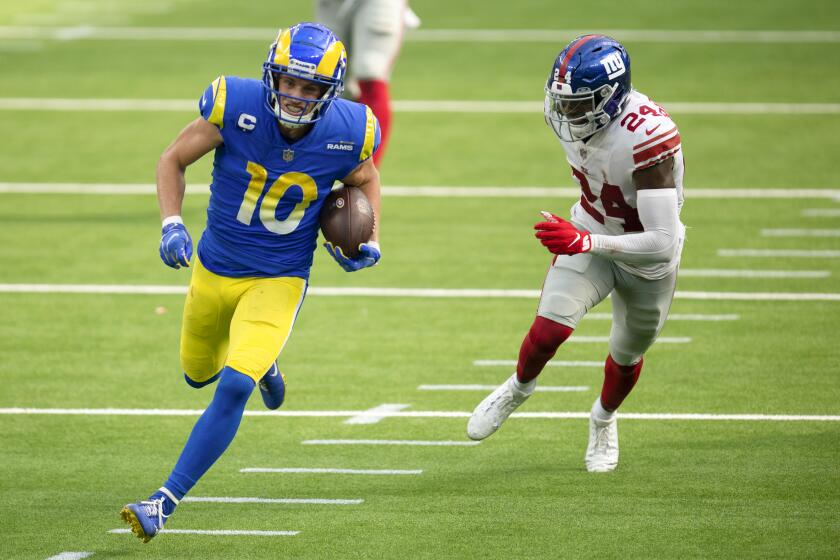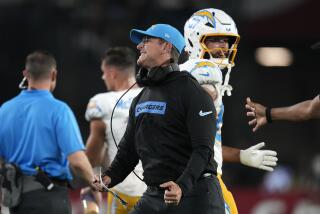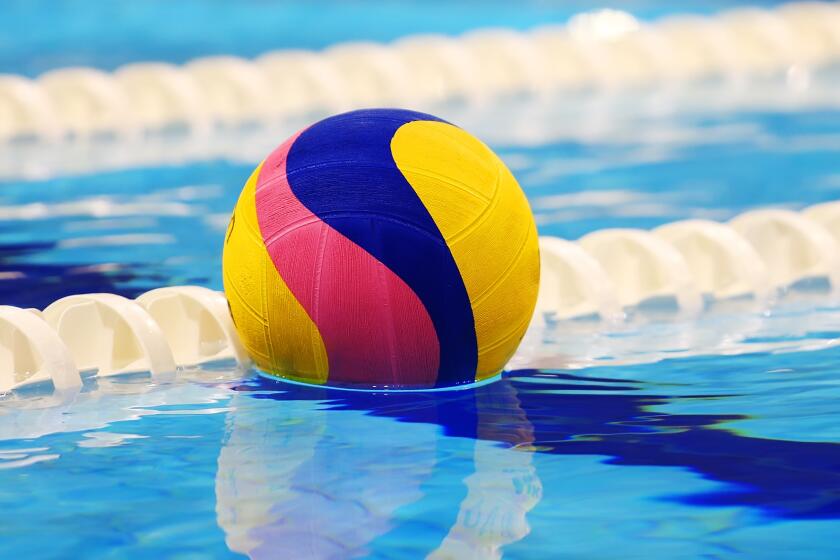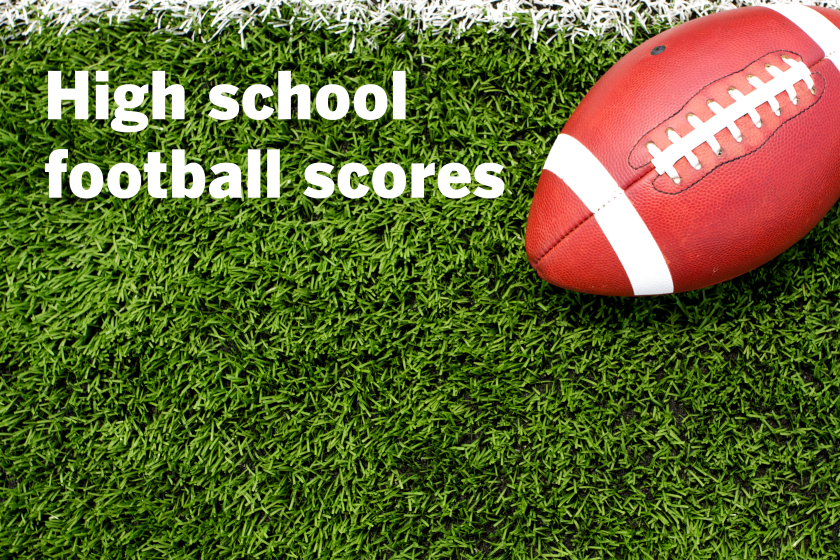Chargers’ Justin Herbert learning he can’t let the perils of running in the NFL slide
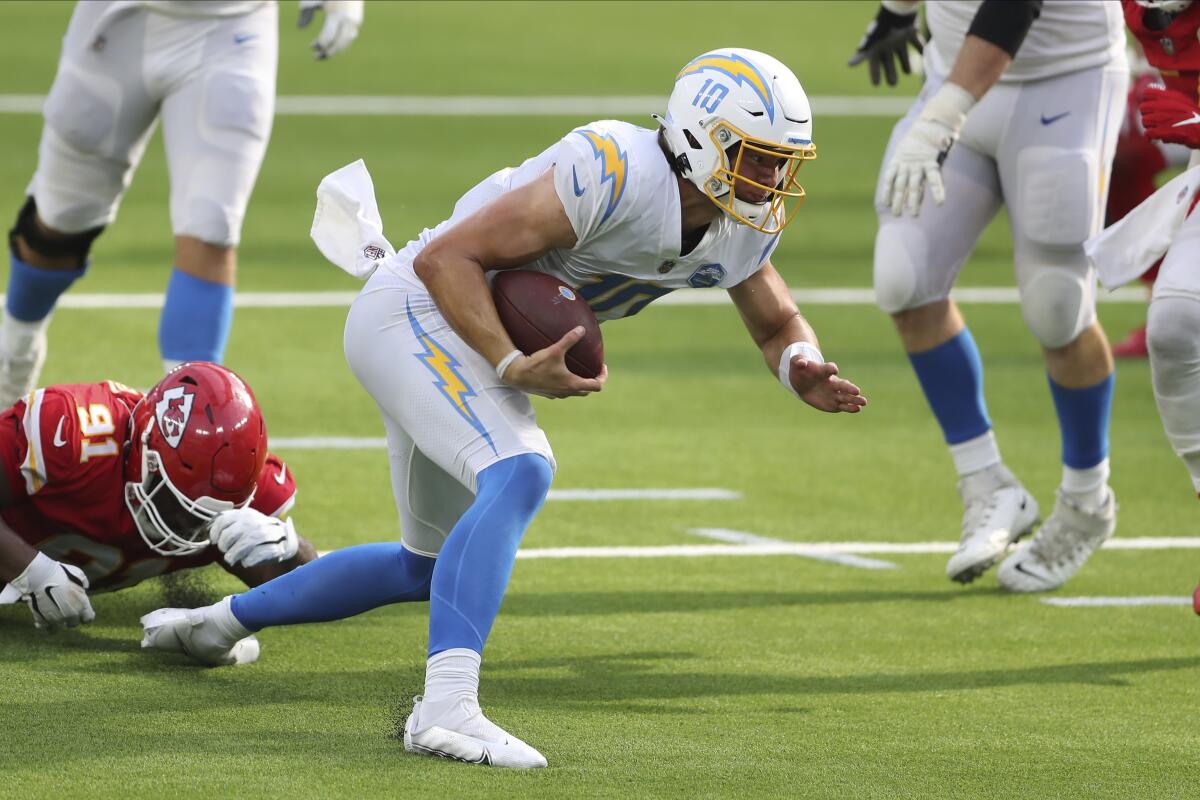
Justin Herbert, with his smooth throwing motion and surgical precision, has proven he’s already a top-notch NFL passer.
Now, the 6-foot-6 Chargers rookie needs to work on his going-to-the-ground game.
He took off running in his first career game and clobbered Kansas City linebacker Damien Wilson when they collided near the sideline. Whereas Herbert nonchalantly popped to his feet, Wilson appeared knocked out cold.
Two weeks later, Herbert tore off a five-yard run against Tampa Bay and lowered his shoulder on Buccaneers safety Jordan Whitehead. This time, the defensive player got the better of the crash, as Herbert needed a few moments with his hands on his knees to compose himself. Whitehead was flagged for unnecessary roughness.
“Feet-first sliding is probably the best option I should go with,” Herbert conceded later. “I grew up playing baseball so I feel like I’m pretty comfortable with sliding. It’s a little tough on the grass, your cleats get stuck a little bit, but it’s definitely something I’ve been practicing. Moving forward, I’ll be better about it.”
Chargers coach Anthony Lynn hopes so. He could be forgiven for watching replays of those collisions through his fingers while covering his eyes.
Even though the Chargers’ week off came earlier than expected because of NFL schedule changes, Joey Bosa is not complaining because he has injuries that need healing.
“Bad coaching by me right there, bad coaching,” Lynn said. “I don’t want him taking hits like that, like he did from the Chiefs. … I want him to get down. I don’t want him to take those hits in the National Football League.”
Theoretically, Herbert could look across town for pointers from another young quarterback. The Rams’ Jared Goff, the son of a former Major League Baseball player, has had sliding issues of his own.
In the two years since the NFL made a rule change — stipulating a quarterback doesn’t have to slide feet first to be considered giving himself up, and instead is afforded the same defenseless-player protections when he dives forward — Goff has found himself getting “caught in between sometimes.”
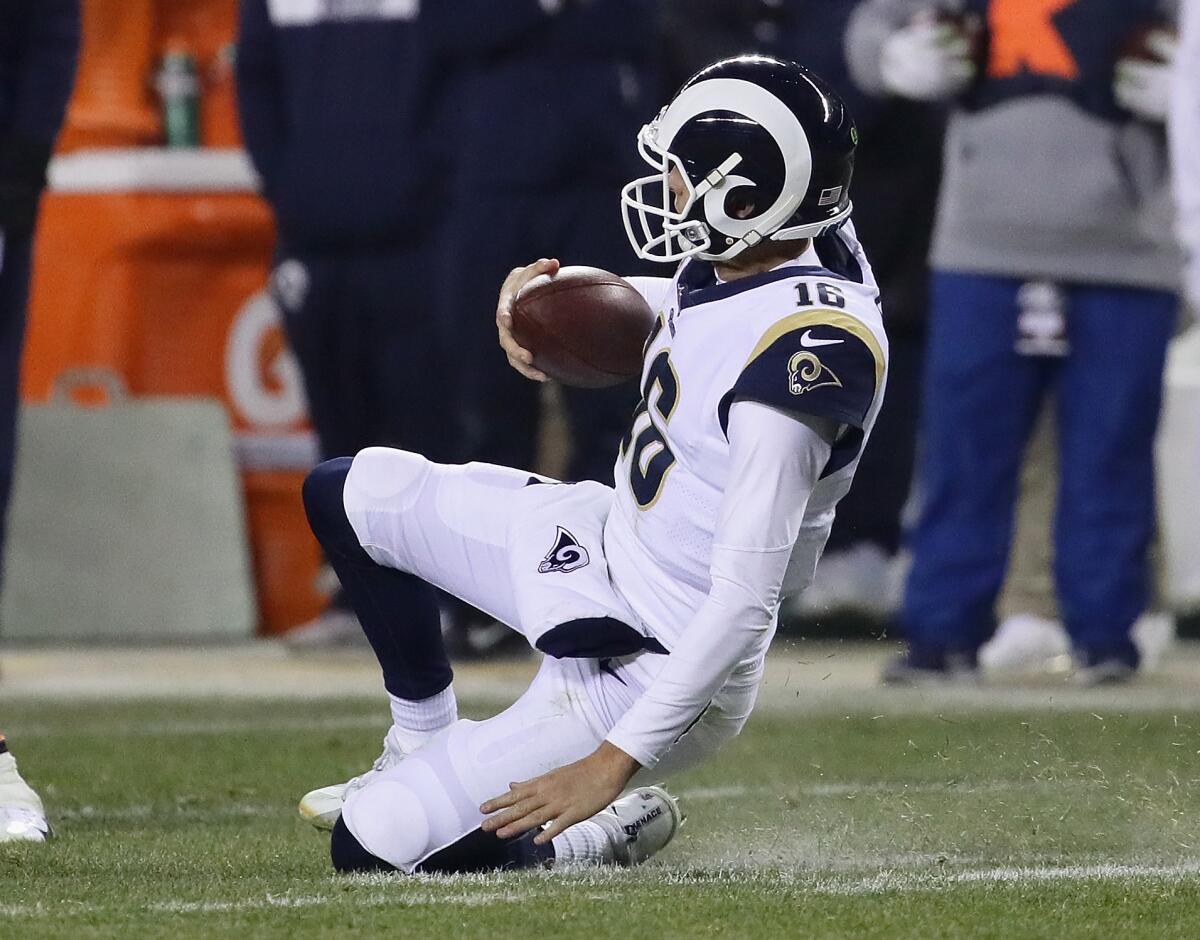
“I’m used to going feet first, and I have my whole career,” Goff said. “And then in the last year or two, I want to go head first. I don’t want to lose those three yards. But at the same time, you’re kind of trying to figure out where your momentum is.”
His father, Jerry Goff, who played catcher in the majors for six years, wishes his son would hit the deck more often, yet understands why he doesn’t always do so.
“Do I encourage him to slide? Yeah, 100%,” the elder Goff said. “But there are times, like he did in the playoffs against Dallas, and a few times in college, where you’ve just got to deal with it and go get that first down. You’re not going to slide short in that situation. But I would say 90% or more, you’re just going to slide and play the next down.”
The dilemma is older than Red Grange. Should a quarterback risk injury by fighting for that extra yard, either by dropping a shoulder and delivering a blow, or by diving forward as a human missile?
Or should he sacrifice that extra yard or two and safely slide feet first?
“We’ve got to coach these quarterbacks out of the macho-man approach,” said Hall of Fame personnel executive Bill Polian, who thinks all NFL teams should build sliding pits at their facilities to teach quarterbacks. “Playoffs are one thing; that’s a different cat altogether. But in terms of the regular season, never lower your shoulder. Don’t take those kinds of blows. The rule is there to protect you: Go slide.”
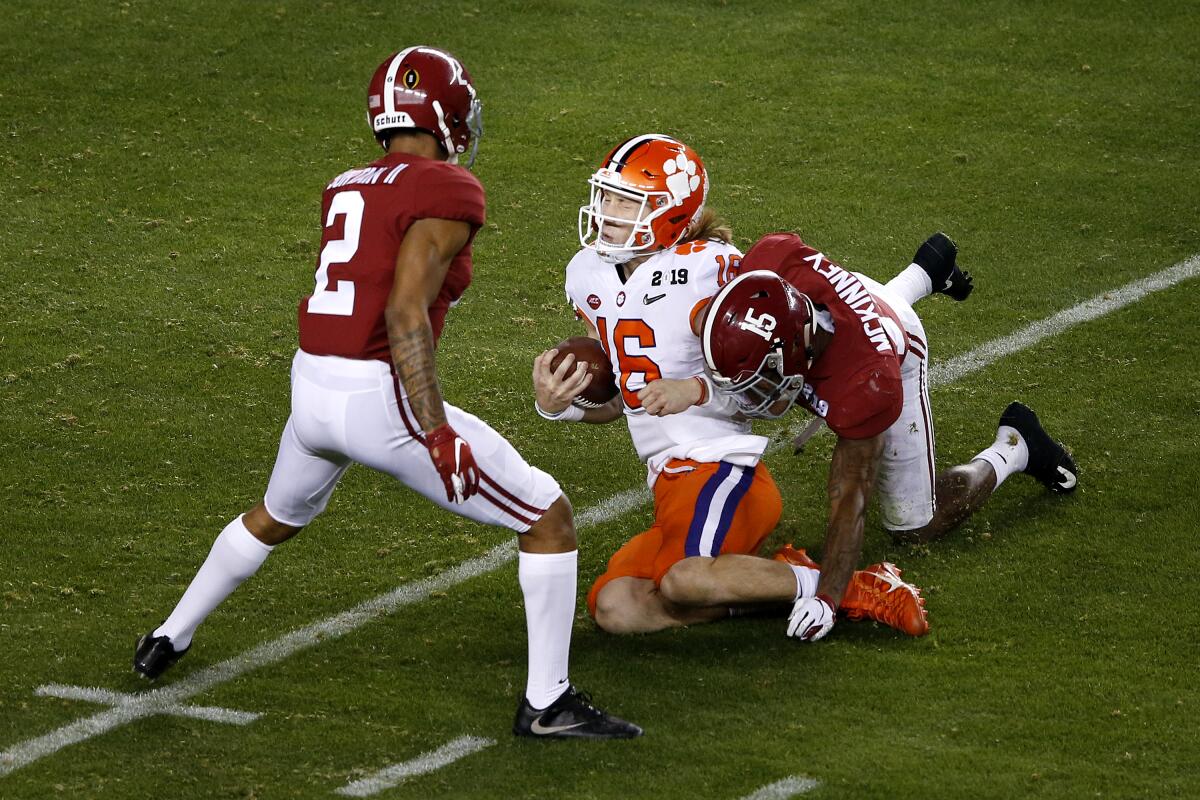
“When it’s your own guy, you want him to get down. ... If he gets tagged, it affects us all.”
— Former Rams defensive lineman D’Marco Farr, on when quarterbacks run
Sometimes, even sliding feet first is unsafe. Last Saturday, Clemson quarterback Trevor Lawrence, the overwhelming favorite to go No. 1 in next spring’s NFL draft, took a shot to the helmet from University of Miami safety Amari Carter while sliding. Officials ejected Carter for targeting.
In 2006, Kansas City quarterback Trent Green absorbed a brutal hit to the head from Cincinnati defensive end Robert Geathers while sliding feet first. Green suffered a serious concussion and the replay reverberated throughout the league.
“I remember being like, ‘Yeah, see? I don’t want that to happen. I would rather dive head first, I’m in control of my head,’” recalled former Seattle Seahawks quarterback Matt Hasselbeck, who took a ribbing from his coaches about his aversion to sliding. “I sort of remember being made fun of by Mike Holmgren and Jim Zorn about how I didn’t slide, like I couldn’t slide.”
So Zorn, the former Seahawks quarterback who later coached the position for the team, unfurled a Slip ‘n Slide at practice in hopes of teaching his passers how to avoid big hits by gracefully going to the ground. He even brought in Seattle Mariners first baseman John Olerud as a sliding tutor.
Robert Woods’ versatility is what makes him a great contributor to the Rams’ offense, but against Washington he finally got hands on the long ball.
“The thing was, we knew how to slide,” Hasselbeck said. “It wasn’t like we didn’t know. We just preferred to dive.”
According to NFL rules, a defender must pull up when a runner gives himself up with a feet-first slide. If a defender already has committed himself and makes unavoidable contact with the sliding runner, it is not a foul unless the defender makes forcible contact to the head or neck area of the runner with the helmet, shoulder or forearm, or commits some other act that is unnecessarily rough.
But the runner bears the responsibility of starting his slide with ample time for the defender to pull up and avoid the hit.
“Pursuing a guy, I would give him the benefit of the doubt that he was going to slide,” former Rams defensive tackle D’Marco Farr said. “But you’d better start that slide within two or three steps of me. Make it obvious. If not, I’m going to treat you as a runner that’s attacking my goal line, which means I’m going to try to knock your teeth out.”
The notion of sliding never appealed to Hall of Fame quarterback Steve Young, but not because he sought those extra yards at all costs. He just didn’t feel that sliding provided him enough protection.
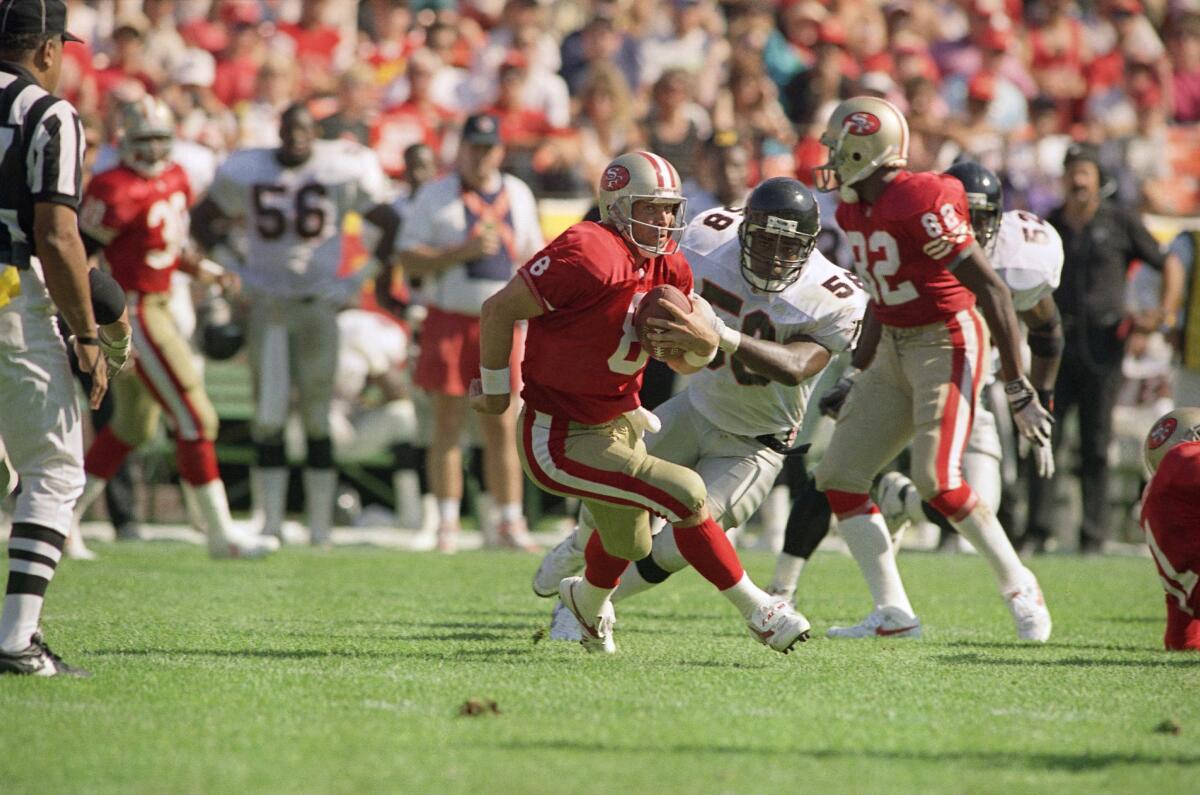
“My own philosophy was sliding was a nightmare,” Young said. “Sliding is saying, ‘Just hit me in the face.’ I always thought it was much safer to go forward, find a soft spot forward.”
What’s more, Young said, officials routinely get the placement of the ball wrong when a player slides feet first.
“Inevitably, the referee gives you a spot farther back than you thought it would be, or than it should be,” he said. “It’s a weird thing. I don’t know what sliding does that creates this image that the ball’s downed earlier than it was.
“I always thought I got a better spot when I was going forward. It’s like an optical illusion for them. When I slid, nine times out of 10 I’d turn around and say, ‘Where are you marking that? That’s not right.’”
Not surprisingly, some of the quarterbacks who had the option of playing pro baseball — notably Seattle’s Russell Wilson and Arizona’s Kyler Murray — are the most graceful sliders.
For Alex Smith’s father, Doug, it was emotional and inspiring to see his son play quarterback Sunday for the first time since his gruesome leg injury.
“I think playing multiple sports is a very big thing in terms of getting those extra yards, also being smart, getting down,” Wilson, selected in two different MLB drafts, told reporters in 2017. “The ability to quickly slide, too. When you hit a ball in the gap, you’ve got to get to second base and get there fast. You’ve got to know where to slide, how to get around the tag, and everything else.
“I don’t really like sliding head first, never did when I was playing baseball. But sometimes it’s necessary. … You’ve got to be smart in how you do it.”
Not everyone is a pretty slider. Peyton Manning got an earful from his Denver teammates in 2012 when he clomped downfield against Carolina, then executed a hideous slide — think Evel Knievel at Caesars Palace — that excavated a sizeable divot when his left knee brace burrowed into the turf.
“It’s not even worth explaining what happened,” Manning told reporters at the time. “It looked bad, and the fact that my knee brace got caught, nobody wants to hear that. It is what it is, as they say, and it’s right there on film. I’m very aware that it’s fair game for criticism and ridicule.”
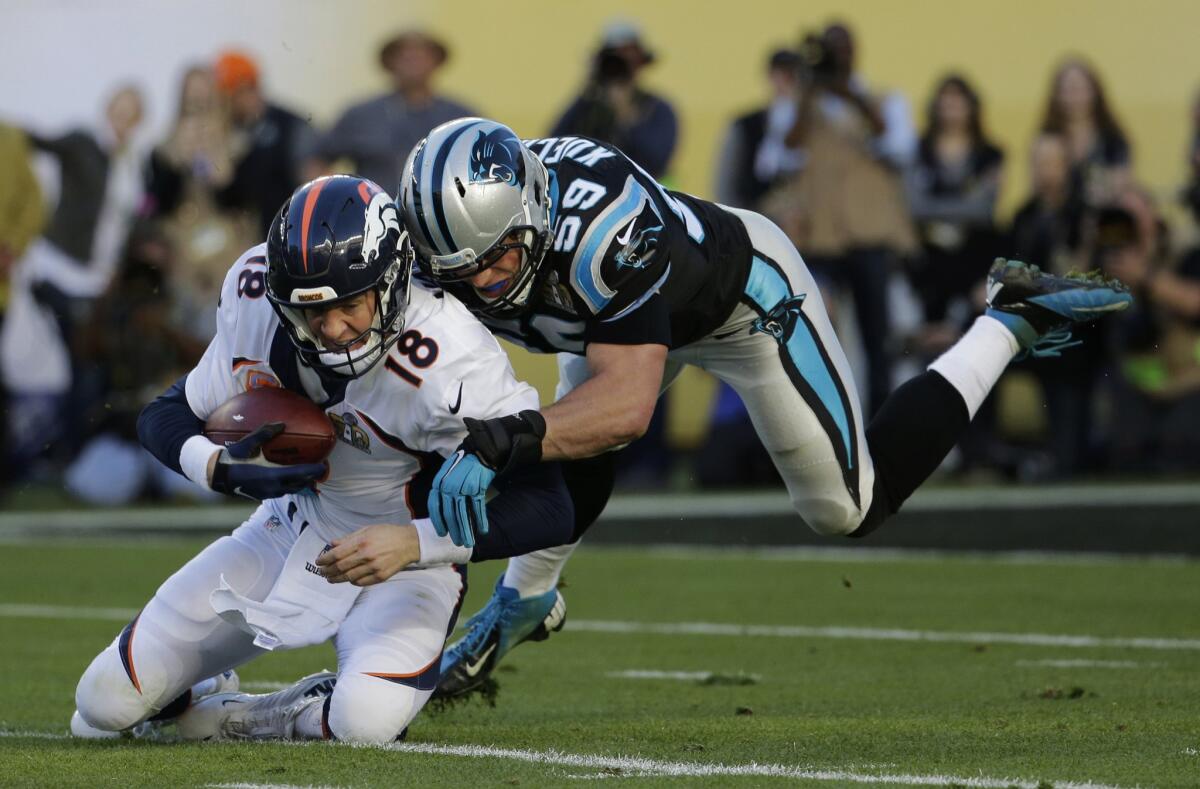
In those hold-your-breath bashes of bodies, it’s frequently the quarterback who comes away staggering. There’s a reason for that.
“Justin Herbert does no tackling. None,” Young said. “And then he’s running into people where that’s all they do is tackle.
“I used to see smaller guys in the defensive backfield, and I was like, ‘OK, I can take that guy on.’ But you’ve got to remember, even those guys, that’s all they do is tackle.”
When and whether a quarterback should slide often depends on where you’re standing, as in, which sideline.
The Chargers lose another close game, this time to the Saints in overtime. Meanwhile, the Rams keep delivering in clutch.
“When it’s your own guy, you want him to get down,” Farr said. “When Kurt Warner scrambled, I’d be the first one yelling, ‘Get down!’ And I would tell him, ‘Your body doesn’t belong to you, it belongs to us.’ If he gets tagged, it affects us all.”
Young’s philosophy: Your most important play is your next one.
“Risks just to show your manhood don’t help you get to the next play,” he said. “The truth is, if you’ve still got the ball in your hand, there’s been a general failure anyway. Don’t compound it by trying to run over somebody to impress someone.”
After Herbert’s debut, while the Chargers and Chiefs were mingling on the field, Kansas City’s Patrick Mahomes offered him some words of advice: “Protect yourself on some of those runs.”
Sometimes, staying up requires getting down.
More to Read
Go beyond the scoreboard
Get the latest on L.A.'s teams in the daily Sports Report newsletter.
You may occasionally receive promotional content from the Los Angeles Times.

